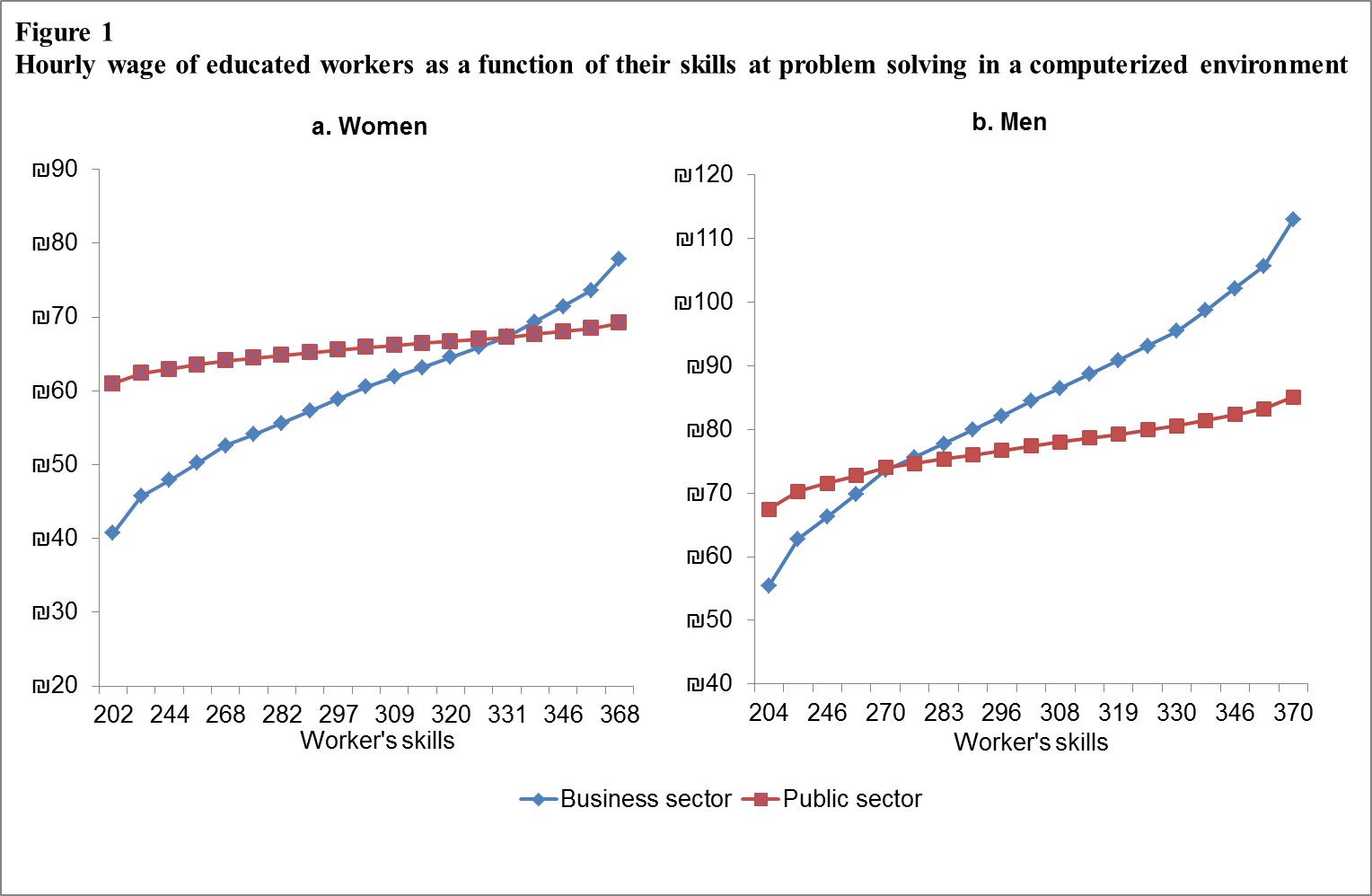Excerpt from the Fiscal Survey and collection of research issues that will be published soon:
· The return on the cognitive skills of workers is higher in Israel than in other advanced countries. The gap is derived from the business sector (and not from the public sector).
· The return on cognitive skills in the business sector is higher than in the public sector—a finding that is common in other advanced economies as well, but the difference is more pronounced in Israel. The gap in Israel is derived from the gap between the sectors among employees with higher education.
· The difference between the two sectors in the return on skills reflects variance between the two sectors in the wage setting mechanism. While the business sector rewards skills even if they are not tied to officially measured characteristics, the public sector wage agreements reward skills predominantly in relation to formal education and tenure.
The public sector in Israel and in most advanced economies is characterized by a salary structure and employment arrangements that are different from the business sector. For the most part, these include collective labor agreements in which the process of setting wages and promotion is formal. These arrangements make it difficult for the public sector to compensate employees on the basis of performance, and cause wages to be based mainly on measurable variables such as education and tenure.
An analysis conducted by the Bank of Israel using the new skills survey by the OECD’s Programme for the International Assessment of Adult Competencies (PIAAC) examines whether the connection between cognitive skills that are not formally observed and wages in the business sector really is stronger than in the public sector. The skills were measured in the survey through tests in mathematical ability, reading skills and problem solving in a computerized environment.
The examination was carried out by a statistical analysis of the wage gap between workers in respect of higher cognitive abilities—meaning the return on skills. The estimate of the return on skills was conducted separately for workers belonging to the business sector and the public sector, and according to division by gender and level of education of the employees.

The analysis found that the return on workers’ skills is higher in the business sector. This means that if we compare two workers with similar characteristics and with the same education, one from the public sector and one from the business sector, the wage of the worker in the business sector is more influenced by his or her cognitive skills than the wage of the employee in the public sector. The gap originates with workers with higher education. In particular, the return on problem solving skills in a computerized environment is five-fold higher for women and three-fold higher for men in the business sector than in the public sector. About 20 percent of the gap is a result of the particularly high return for business sector ICT workers, but even excluding this group, the gap in favor of the business sector remains statistically significant. Among workers with no higher education, there was no gap found between the sectors in the return on skills.
After controlling for the observed characteristics of the workers, the excess return on skills among workers with a higher education in the business sector (compared with educated workers in the public sector) is reflected in significant wage gaps between the two sectors (Figure 1). For instance, among women in the 70th percentile or higher regarding problem solving skills in a computerized environment, (a score of more than 330 in the skills test), there was a positive wage gap in favor of business sector workers, which increases with the level of skill. Among men, the wage gap in favor of the business sector develops among workers in the 30th percentile regarding those same skills (test score of 275 or more). Similar results were obtained regarding the two other skills that were examined.
This finding is apparently a result of the difference between the wage setting mechanisms of the two sectors. The business sector more directly compensates for the skills themselves regarding workers with higher education, and particularly among educated women. In contrast, the public sector employs more workers with higher education and compensates them based on their formal education and their tenure. While education is positively correlated with skills, there is a negative correlation between tenure (age) and skills. Therefore, indirectly, the prominent additional wage for tenure in the public sector lowers the return on cognitive skills in this sector.
An international comparison of the return on skills shows that in most advanced economies, such as Israel, the return on skills in the business sector is higher than in the public sector (Figure 2). However, it was also found that in Israel the return in the business sector is particularly high, while in the public sector it is similar to the average in the other countries in the sample. In other words, the excess return on skills in the business sector in Israel is what leads to the high ratio between the returns in the two sectors by international comparison. Among other things, the high return on skills in Israel reflects the rarity of such skills relative to other countries where the level of skill among the population is higher.
